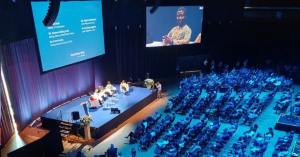Physical Address
23,24,25 & 26, 2nd Floor, Software Technology Park India, Opp: Garware Stadium,MIDC, Chikalthana, Aurangabad, Maharashtra – 431001 India
Physical Address
23,24,25 & 26, 2nd Floor, Software Technology Park India, Opp: Garware Stadium,MIDC, Chikalthana, Aurangabad, Maharashtra – 431001 India

Exploring innovative ways to tackle the global water crisis, World Water Week 2023 kicked off last week at the Stockholm Waterfront Congress Centre. World Water Week welcomed participants from all over the world to join hands for a better water future. With recaps and inspiring reading, let’s see what’s happening during the conference.
Day 1 – Centre Stage
World Water Week’s Centre Stage was the inclusive
meeting place for all participants. The opening session starts with the speakers: President of the United Nations General Assembly, Mr. Csaba Körösi, and Sweden’s Minister for International Development Cooperation and Foreign Trade, Mr. Johan Forssell.
After that, the talk show series SIWI Corner, hosted by Andreas Karlsson, where leading water experts share their insights in inspiring conversations about pressing water topics.
Green water investments – the future of Africa? It was one of the fieriest topics. With a rapidly changing climate, rainfall patterns are becoming increasingly unpredictable. Yet, African farmers are highly dependent on rainfall, with 80% of smallholder farmers relying on rainwater for watering crops. The session focused on rain-fed agriculture techniques and localised food production. The session highlighted farmers as Africa’s frontline water managers. The second session highlighted the groundwater economics under climate change. Extreme weather events and climatic shocks are an urgent reminder to redouble our efforts to ensure regulation, protection, and integration of groundwater resource management, as covered in a studio talk show session. Last but not least, the SIWI Seminar explored barriers and opportunities for increasing water finance.
Day 2 – Planting the seeds of change
The exciting final of the Stockholm Junior Water Prize 2023 takes place on Centre Stage on the second day. HRH Crown Princess Victoria of Sweden presented the Prize. Naomi Park from the USA received the prize for her research on removing carbon contaminants from the ocean. Naomi found a way to transform Styrofoam debris into an effective solution to remove carbon dioxide and crude oil. The Jury noted, “The winner is taking a troublesome waste product and using it to help solve a number of the most pressing issues we face in the modern world. By using Styrofoam and creating a ‘sponge’ that absorbs carbon dioxide and oil products from the ocean, this student built a model and tested it – in multiple conditions, even simulating ocean waves – with impressive results.”

Inger Axiö Albinsson of the Stockholm Sámi Association started the seminar session. The session is ‘Respect, Reciprocity, Relatedness, Indigenous Peoples and Living Waters’. Eight representatives from indigenous communities from across the globe shared their very different stories, yet with remarkably similar water challenges.
Day 3 –Celebrating the seedlings of change
SIWI Corner started with a dialogue on Indigenous Peoples’ Water Knowledge. After that, the 2023 Stockholm Water Prize Laureate was awarded the presence of the prize’s patron, H.M. King Carl XVI and Crown Princess Victoria. Professor Andrea Rinaldo won the award for his innovative and groundbreaking work spanning the fields of hydrology, hydrogeomorphology, and epidemiology.
The thematic dialogue starts with the title of digitalisation and the role of education as a tool for change. The digitisation of data and the Internet of Things bring a holistic view of how the technological revolution is shaping human interactions, not only amongst ourselves but primarily with the environment. During this debate, six young water professionals discussed the need for and against relying on innovation to solve today’s water challenges.
Day 4 –Cultivating the next steps
It was the last day of the conference. Last SIWI corner tackles one of today’s most critical and misunderstood questions: How can transboundary water cooperation make regions more peaceful and resilient?
You can read more from Cooperation.
In the centre stage, the new Dutch Special Envoy for International Water Affairs shares her thoughts about wastewater and how this problem is turning a problem into a solution. Session highlights with increasing water demand, growing scarcity, and the devastating impact of climate change; it is imperative to rethink the approach to wastewater management and effective communication.
The closing plenary in the final hour focused on what lies ahead. What seeds of change have been planted this week, and what can we do to nurture their growth and fruition? Discussed how these insights can be applied to next year’s theme, which will be unveiled during the ceremony.
With a record number of participants from almost every country on Earth, World Water Week 2023 is set to have a lasting influence. As organisers, SIWI summarised that more than 300 sessions have been conducted, and more than 15,000 individuals participated in the event globally. More in-depth analyses of discussions will be provided later by both World Water Week’s Scientific Programme Committee and the Junior Rapporteurs who follow the sessions. Recordings from all sessions are exclusively available on the online conference platform for six more weeks. They will then be uploaded to YouTube for wider public viewing so you can reach out. More such info follows Climate Fact Checks.
If you have any queries or come across suspicious content related to climate change or the environment and want us to verify them for you, then send them to us on our WhatsApp hotline: +917045366366